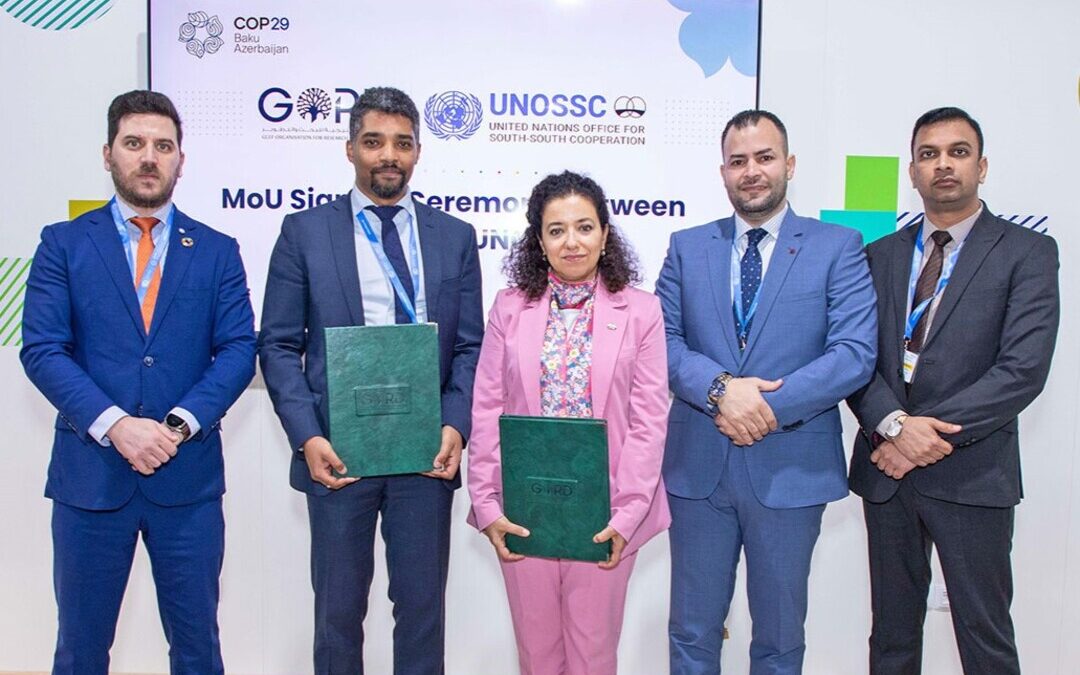At COP29, Gulf Body Leads Strategic Push to Combat Global Climate Challenges
GORD unveils bold initiatives at COP29, forging global partnerships to drive climate action, renewable energy and sustainability worldwide.
The Doha-based Gulf Organisation for Research and Development forged a strategic partnership with the United Nations Office for South-South Cooperation on Sunday to set the stage for South-South and Triangular Cooperation Solutions Lab, an initiative to foster collaboration across the Global South.
Designed to leverage collective expertise from developing nations while incorporating support from the Global North, the lab will focus on advancing the United Nations Sustainable Development Goals. It prioritizes climate action, clean energy, health, and sustainable agriculture.
“By joining forces for the creation of the South-South and Triangular Cooperation Solutions Lab, we are continuing our commitment to driving innovation and fostering practical solutions that meet the unique development challenges of the Global South,” said GORD Founding Chairman Yousef Alhorr in a statement.
Green Events Tool
In a move to address the environmental impact of global events, GORD partnered with the Joint Meeting Industry Council through another MoU.
Central to this collaboration is the Green Events Tool, developed in partnership with the United Nations Environment Programme and the UN Framework Convention on Climate Change.
GET allows event organizers to assess and mitigate their environmental footprints, focusing on energy use, transportation, and waste management.
The statement said that GORD and JMIC aim to promote the widespread adoption of this tool, aligning the events industry with the Net Zero Carbon Events initiative’s goal of achieving net-zero emissions by 2050.
“The events industry is on a growth trajectory that, if left unchecked, could exacerbate its environmental footprint,” Alhorr remarked. “While the Green Events Tool offers a powerful solution to measure and mitigate that impact, its potential can only be realized when it is adopted at scale.”
Advancing Renewable Energy in the MENA Region
Furthering its regional impact, GORD joined forces with the Regional Centre for Renewable Energy and Energy Efficiency to accelerate the adoption of renewable energy and energy-efficient practices across the Middle East and North African region.
Initiatives under this MoU include promoting sustainable building practices and deploying GORD’s Energia Suite software to measure and reduce carbon footprints.
Alhorr stressed the significance of this shift: “Given the Arab region’s historical reliance on hydrocarbons, it is critical that we embrace a diverse energy future that includes renewable energy and energy-efficient solutions.”
Building Carbon Markets in Burundi
GORD’s Climate Action Center of Excellence also partnered with Burundi’s Ministry of Environment, Agriculture, and Livestock to expand its global reach.
This MoU focuses on developing a robust regulatory framework for carbon markets under Article 6 of the Paris Agreement.
The collaboration aims to strengthen Burundi’s capacity in international carbon trading by establishing transparent systems and providing technical assistance.
Initial efforts will prioritize policy development to ensure the integrity of carbon markets, enabling Burundi to contribute actively to global climate goals.
Looking Ahead
As COP29 enters its second week, GORD plans to transition from formalizing agreements to engaging in technical sessions to accelerate low-carbon solutions.
Its pavilion in the Blue Zone will host climate leaders and innovators, offering a platform for dialogue and collaboration.
From fostering South-South cooperation to championing sustainability in the events industry and advancing renewable energy in the MENA region, GORD’s initiatives at COP29 underline its commitment to addressing the world’s most pressing climate challenges.

